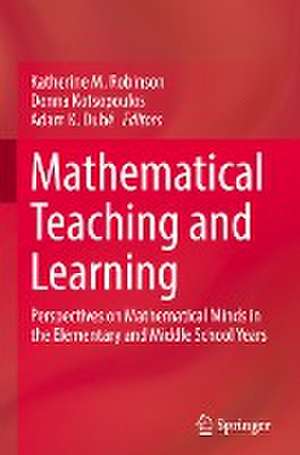Mathematical Teaching and Learning: Perspectives on Mathematical Minds in the Elementary and Middle School Years
Editat de Katherine M. Robinson, Donna Kotsopoulos, Adam K. Dubéen Limba Engleză Hardback – 16 iun 2023
This book and its companion, Mathematical Cognition and Understanding, take an interdisciplinary perspective to mathematical learning and development in the elementary and middle school years. The authors and perspectives in this book draw from education, neuroscience, developmental psychology, and cognitive psychology. The book will be relevant to scholars/educators in the field of mathematics education and also those in childhood development and cognition. Each chapter also includes practical tips and implications for parents as well as for educators and researchers.
Preț: 1112.30 lei
Preț vechi: 1356.45 lei
-18% Nou
Puncte Express: 1668
Preț estimativ în valută:
212.87€ • 221.41$ • 175.73£
212.87€ • 221.41$ • 175.73£
Carte disponibilă
Livrare economică 25 martie-08 aprilie
Preluare comenzi: 021 569.72.76
Specificații
ISBN-13: 9783031318474
ISBN-10: 3031318471
Pagini: 233
Ilustrații: X, 233 p. 38 illus., 20 illus. in color.
Dimensiuni: 155 x 235 mm
Greutate: 0.54 kg
Ediția:2023
Editura: Springer International Publishing
Colecția Springer
Locul publicării:Cham, Switzerland
ISBN-10: 3031318471
Pagini: 233
Ilustrații: X, 233 p. 38 illus., 20 illus. in color.
Dimensiuni: 155 x 235 mm
Greutate: 0.54 kg
Ediția:2023
Editura: Springer International Publishing
Colecția Springer
Locul publicării:Cham, Switzerland
Cuprins
Chapter 1. An introduction to mathematical teaching and learning in the elementary and middle school years.- Part I: PEDOGICAL APPROACHES TO TEACHING.- Chapter 2. Instructional Supports for Mathematical Problem Solving and Learning: Visual Representations.- Chapter 3. Equilibrated Development Approach to Word Problem Solving in Elementary Grades: Fostering Relational Thinking.- Chapter 4. Experiences of Tension in Teaching Mathematics for Social Justice.- Chapter 5. Designing Inclusive Educational Activities in Mathematics: The Case of Algebraic Proof.- Chapter 6. A Sustained Board Level Approach to Elementary School Teacher Mathematics Development.- Part II: MATHEMATICAL LEARNING.- Chapter 7. A Digital Home Numeracy Practice (DHNP) Model to Understand the Digital Factors Affecting Middle School Children’s Mathematics Practice.- Chapter 8. How Number Talks Assist Students in Becoming Doers of Mathematics.- Chapter 9. Language Matters: Mathematical Learning and Cognition in Bilingual Children.- Chapter 10. Mathematical Creativity of Learning in 5th Grade Students.- Chapter 11. Symbolic Mathematics Language Literacy: A Framework and Evidence from a Mixed Methods Analysis.- Chapter 12. Grasping Patterns of Algebraic Understanding: Dynamic Technology Facilitates Learning, Research, and Teaching in Mathematics Education.- Index.
Notă biografică
Katherine Robinson is a professor in the Department of Psychology at Campion College at the University of Regina, Saskatchewan, Canada. Her research interests focus on cognitive development with special emphases on the development of conceptual and strategic understanding in arithmetic in both children and adults. She is a member of The Campion College Mathematical Cognition Centre (mc2).
Donna Kotsopoulos is the Dean and a professor in the Faculty of Education, at Western University, Ontario, Canada. Her research focuses on mathematical cognition and learning across the lifespan. Her research has resulted in social innovation with the LittleCounters® program – a community and early child care centre play-based early numeracy program.
Adam Dubé is an Associate Professor of Learning Sciences in the Faculty of Education, at McGill University, Quebec, Canada. His research focuses onthe use of educational technology and games with emphases on how these technologies affect mathematical cognition. He is an AERA-SRCD Early Career Fellow in middle childhood education and development and his work has informed the UNESCO-MGIEP ‘Industry Guidelines on Digital Learning’.
Textul de pe ultima copertă
This book focusses on teaching and learning in elementary and middle school mathematics and suggests practices for teachers to help children be successful mathematical thinkers. Contributions from diverse theoretical and disciplinary perspectives are explored. Topics include the roles of technology, language, and classroom discussion in mathematics learning, the use of creativity, visuals, and teachers’ physical gestures to enhance problem solving, inclusive educational activities to promote children’s mathematics understanding, how learning in the home can enhance children’s mathematical skills, the application of mathematics learning theories in designing effective teaching tools, and a discussion of how students, teachers, teacher educators, and school boards differentially approach elementary and middle school mathematics.
This book and its companion, Mathematical Cognition and Understanding, take an interdisciplinary perspective to mathematical learning and development in the elementary and middle school years. The authors and perspectives in this book draw from education, neuroscience, developmental psychology, and cognitive psychology. The book will be relevant to scholars/educators in the field of mathematics education and also those in childhood development and cognition. Each chapter also includes practical tips and implications for parents as well as for educators and researchers.
This book and its companion, Mathematical Cognition and Understanding, take an interdisciplinary perspective to mathematical learning and development in the elementary and middle school years. The authors and perspectives in this book draw from education, neuroscience, developmental psychology, and cognitive psychology. The book will be relevant to scholars/educators in the field of mathematics education and also those in childhood development and cognition. Each chapter also includes practical tips and implications for parents as well as for educators and researchers.
Caracteristici
Includes international perspectives on middle school mathematics Conducts an interdisciplinary approach to teaching and learning mathematics Draws a union between education and psychology
